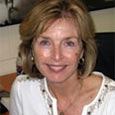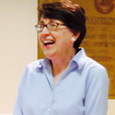English Department Bids Farewell to Two Retiring Professors
May 25, 2015
Two of our most admired colleagues, Dr. Karen Fitts and Dr. Judy Scheffler, retired at the end of spring 2015. They taught in the English Department for a combined 45 years and compiled distinguished records in teaching, scholarship, and service. We are grateful to them for their remarkable contributions and wish them well in their retirement years. The following remembrances were written by their colleagues, as noted below.
Karen Fitts

Dr. Karen Fitts, one of the most student-oriented teachers most of us have ever known, has retired. Over almost two decades in our department, the great teaching of Dr. Fitts included many courses incorporating writing and cultural issues. She served as an innovative Director of the University Writing Center from the spring of 2012 to 2015, training and guiding students from many disciplines as writing tutors. In this Writing Center work, she focused on enhancing services to our increasingly diverse student body, especially second language and international students; she also established a new, additional Writing Center location in our university's Center City Campus in the heart of Philadelphia.
Among the many memorable classes Dr. Fitts taught were the writing-emphasis courses "Women, Science, and Society"; "Urbanism and the Modern Imagination"; the upper-division written rhetoric courses "Propaganda, Power, and Politics" and "I, Cyborg: Technology, Writing, and the Body"; and the seminars she designed herself on "Bio-Rhetorics: Male and Female in the Scientific Imagination"; "Rhetoric, Science, and Society"; and "A Life of Inquiry: Questions, Meaning, Mystery." All of these courses incorporated her scholarship to inform her teaching. She invited students toward transformative growth in their understanding of her hallmark themes of interdisciplinarity, diversity, gender, culture, and written communication.
Scholars in the field of composition and rhetoric know Dr. Fitts for her impressive publications, including Left Margins: Cultural Studies and Composition Pedagogy (1995), a highly influential book on critical composition co-edited with Alan W. France; eight peer-reviewed articles and book chapters; five reviews in major academic journals; and some two dozen papers at national and international conferences.
Of course, those of us at WCU, students and faculty alike, know Dr. Fitts for more than her list of accomplishments: we know her for the outstanding kindness, collegiality, common sense, and good humor that she shared with our academic community. We were most fortunate to have this talented, energetic, highly gracious individual in our program. We miss her, but we do not forget her, and we wish her well in her retirement.
— Bill Lalicker and Cortie Ervin
Judith Scheffler

Dr. Judith Scheffler taught in the English Department for 30 years. As a scholar, teacher, and activist, she strove to embody the spirit of humanitarianism, fostering a culture of patience and empathy in all professional matters even as she set exactingly high professional standards for herself.
These values are well reflected in Dr. Scheffler's teaching and scholarship. Her work in an under-researched area—the writings of women prisoners—won her wide acclaim. She brought this rich material into the classroom by developing and teaching numerous courses on women's prison writings and by exposing her students to authors ranging from nineteenth-century Quaker activists such as Rebecca Lukens to women and girls in the contemporary criminal justice system. One of Dr. Scheffler's earliest published essays, "The Prisoner as Creator in Norman Mailer's The Executioner's Song," was selected by the renowned literary scholar Harold Bloom for reprinting in his Modern Critical Views volume on Norman Mailer. Her book Wall Tappings: An International Anthology of Women's Prison Writings, 200 A.D. to the Present (The Feminist Press, 2003) won the Susan Koppelman Award for Popular Culture from the Women's Caucus of the Popular Culture Association.
Dr. Scheffler's scholarly writing also appeared in a number of anthologies and edited collections, including the Heath Anthology of American Literature, the Encyclopedia of Women's Autobiography, and Prose and Cons: New Essays on U.S. Prison Literature, among others. Notably, she remained a prolific scholar up through her retirement: in 2014, her article "'Wise as Serpents and Harmless as Doves': The Contributions of the Female Prison Association of Friends in Philadelphia, 1823-1870" was published in the journal Pennsylvania History, and her essay "'...to speak in one's own voice': the Power of Women's Prison Writing" was included in the book Women, Writing, and Prison: Activists, Scholars, and Writers Speak Out.
In addition to her focus on women's life writing and prison literature, Dr. Scheffler was also highly active in the field of Business and Technical Writing. She served as the longtime coordinator of the English Department's Business & Technical Writing Minor and also helped to develop WCU's Pharmaceutical Product Development (PPD) degree program. Her publications and conference papers in the field of Business and Technical Writing were extensive as well.
Dr. Scheffler's involvement with the university and in the larger community remains ongoing. Her favorite activity is serving as a judge for the Philadelphia National History Day competition (High School Senior Division). Perhaps her most lasting legacy, though, is the respect and gratitude of the thousands of students she has taught and the many colleagues she has influenced. We are grateful to Dr. Scheffler not only for her wisdom and professionalism but for her generosity, wry sense of humor, and warmth of spirit. She will be sorely missed.
— Jane Jeffrey and Geetha Ramanathan
